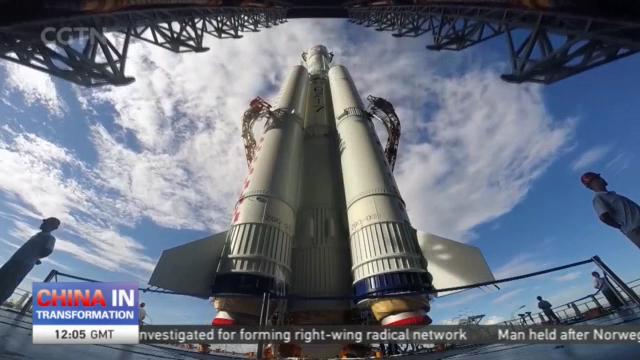
21:58, 18-Dec-2018
40 Years of Development: Young talent needed as space collaboration gathers pace
Updated
20:46, 21-Dec-2018
04:01

While China's space exploration pursuits have put it on top of the world, the biggest excitement is about what the future holds. Experts say China's space achievements thus far will help the nation boldly go where no one has gone before. CGTN's Wu Lei explains.
2018 will enter the records as the busiest year in Chinese Space history. About 35 space launches included the highly acclaimed Chang'e 4 mission. It's likely to make China the world's first country to soft-land on the far side of the moon. Former China National Space Administrator Luan Enjie says four decades of space success came about by hard work and a collaborative managing system.
LUAN ENJIE, FORMER ADMINISTRATOR CHINA NATIONAL SPACE ADMINISTRATION "The 300 thousand-plus staff in the Chinese space industry have formed a set of system engineering management experience. It includes methods, regulations, and also the unique Chinese aerospace spirit."
Luan admits that China still lags behind some major space powers like the U.S. and Russia. But so far, China has successfully launched 11 spacecrafts, including six manned spaceflights, lifting 11 astronauts into space. In 2003, Yang Liwei conducted China's first manned mission on the Shenzhou 5 spacecraft. Five years later, Zhai Zhigang carried out a historic spacewalk via the Shenzhou 7. And when Chang'e 1 captured China's first picture of the moon, it kicked off the nation's three-stage moon mission.
LUAN ENJIE, FORMER ADMINISTRATOR CHINA NATIONAL SPACE ADMINISTRATION "We must adhere to developing high technology our own way. Advanced technology cannot simply be bought or given, we need to rely on our own scientists."
And this kind of spirit is expected to be passed on to the next generation of space industry engineers and scientists.
LIU PENG, ASSISTANT MONITORING ENGINEER XICHANG SATELLITE LAUNCH CENTER "As young engineers, we need to be faster in learning to use all this new equipment and technology. We need to grasp professional knowledge, learning not just computer skills, but also mechanical engineering and knowledge about electromagnetic waves."
WU LEI XICHANG SATELLITE LAUNCH CENTER "Many youngsters dream of exploring outer space. And as international cooperation around China's space program gathers pace, more talented and creative young engineers will be needed to join the work."
With a stable launching expertise, China has helped many countries launch their commercial satellites. The nation's Fengyun series weather satellites provide meteorological and maritime services for dozens of countries and regions. And China's Beidou Navigation Satellites system is expected to go global around 2020.
WU YANHUA, VICE ADMINISTRATOR CHINA NATIONAL SPACE ADMINISTRATION "Conducting international cooperation is our basic national policy. We have signed more than 100 cooperation agreements with over 40 countries and international organizations."
Looking ahead, China plans to build its own space station and beyond that: land on Mars.
ARFAN CHAUDHRY, HEAD OF INTERNATIONAL POLICY UK SPACE AGENCY "There's an intent clearly to look at a lunar mission, as well as a lunar base, also look at further development onto Mars and Marshal Programs. So cooperation is essential in terms of space science and space development, and we will look to work closely with our CNSA colleagues on that."
Exploration of the unknown is the impetus for human advancement. China's future space exploration will generate more advanced joint space experiments, and boost economic and social development around the world. WL, CGTN.

SITEMAP
Copyright © 2018 CGTN. Beijing ICP prepared NO.16065310-3
Copyright © 2018 CGTN. Beijing ICP prepared NO.16065310-3